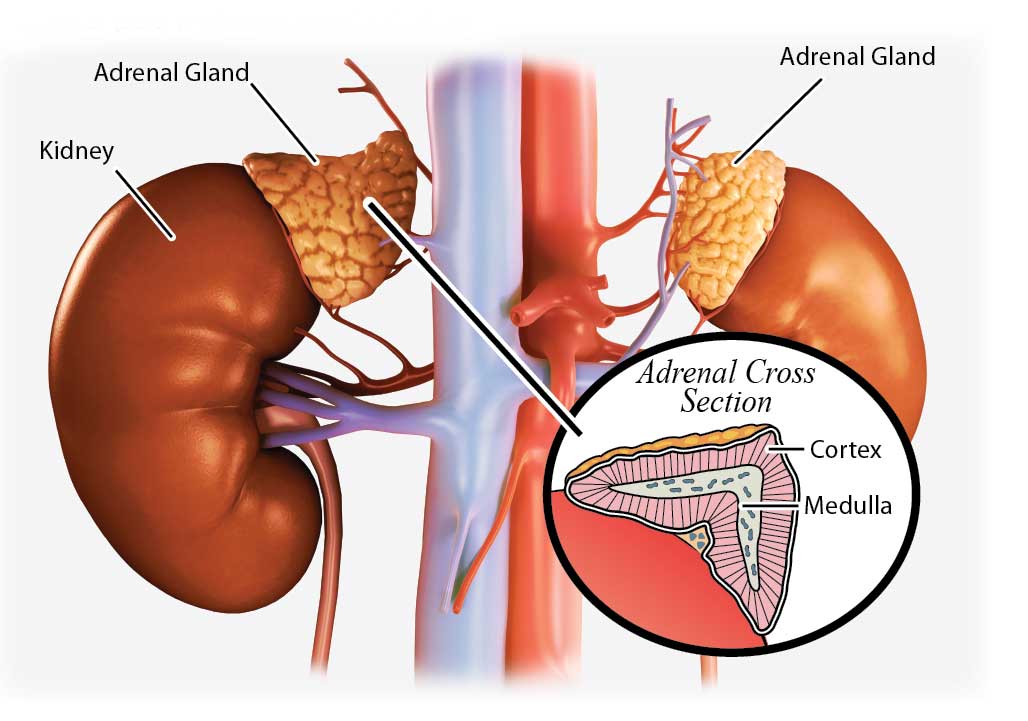Adrenal Gland Exhaustion
The two adrenal glands sit on top of your kidneys and produce several powerful hormones essential for life. This includes the stress hormones (used in fight or flight) known as adrenaline and cortisol. These hormones are produced when we are physically or emotionally stressed to prepare and equip our body to deal with stress. The centre of the adrenal gland (known as the medulla) produces the quick-acting stimulatory hormone adrenaline. It gets us excited and reduces appetite.
The outer layer of the adrenal glands (known as the cortex) produces steroid hormones from cholesterol. In the cortex, cholesterol is turned into the “mother hormone” called pregnenolone, which then gets turned into different steroid hormones. More than 30 steroids are produced in the adrenal cortex, including cortisol and DHEA.

How does adrenal fatigue differ from general day-to-day fatigue?
Fatigue from adrenal gland exhaustion is more severe and persistent than so-called “normal fatigue” which comes and goes. If the adrenals are depleted, you will feel much more fatigued in the mornings, even after a good long sleep and you will gradually improve during the day – indeed you may feel a lot better late at night, but still not energized. Typically, you will crave stimulants (such as caffeine from very strong coffee), nicotine, sugar or other stimulants to get going in the mornings. You will have low resistance to any increase in stress levels both physical, mental, or emotional; you will not cope well with your daily life.
To determine whether you are simply tired from time to time or suffering from true adrenal fatigue, it is essential to look at your signs and symptoms and get the necessary blood tests to measure adrenal gland hormones. It is easy to measure blood levels of cortisol and DHEA and these tests are accurate. Blood cortisol levels are significantly higher in the mornings if the adrenal glands are functioning normally. In someone with true adrenal gland fatigue, blood cortisol levels stay flat with no difference between morning and evening levels.
Normal ranges of cortisol in blood tests
- Normal values at 8 in the morning are 5 to 25 mcg/dL or 140 to 690 nmol/L.
- Normal values depend on the time of day and may vary slightly among different laboratories.
Adrenal gland failure
It is rare for the adrenal glands to fail completely, but if they do it can be due to destructive tumors, infections, hemorrhage, or an autoimmune disease called Addison’s disease. In such cases, cortisol levels are very low and not in the normal range. It is essential to see a specialist endocrinologist in such cases. Total adrenal failure can cause the body to go into shock and can result in a medical emergency. The accurate and speedy diagnosis of adrenal gland failure is imperative given the potential for life-threatening consequences if it is missed.
Conversely, adrenal gland fatigue refers to a state where the adrenal gland hormones are still in the normal range, but at the bottom of normal, along with a host of unpleasant symptoms. The fatigue can be debilitating.
Causes of adrenal fatigue
These include:
- Chronic lack of sleep which upsets circadian rhythm (the body’s normal clock)
- Prolonged unrelenting stress – physical, mental or emotional
- A poor diet lacking in healthy fats, magnesium, vitamin C and other antioxidants
- Excess and prolonged intake of stimulants – i.e. caffeine and/or nicotine or amphetamines
- Chronic illness requiring the use of steroid drugs
- Overtraining in elite athletes or people obsessed with exercising
Signs and symptoms of adrenal fatigue
These can include:
- Unrefreshing sleep
- Intense sugar and/or salt cravings
- Feeling continually overwhelmed and unable to cope with life
- Feeling exhausted in the morning with increasing energy between 4 pm and 10 pm
- Foggy memory and trouble concentrating
- Poor immunity with recurrent infections and inflammation – excess inflammation in the body can be seen on a blood test for C-Reactive Protein (CRP) or ESR
- Easy weight gain
- Inability to lose weight
- Poor recovery after exercise
- Digestive issues (heartburn, flatulence, bloating, constipation and/or diarrhea)
- Headaches
- Increasing allergies
How is adrenal fatigue diagnosed?
Blood tests are available which can measure the levels of the adrenal hormones called cortisol and DHEA. If you are low in these hormones (near the bottom of the normal range), this usually indicates adrenal fatigue. To check cortisol levels blood must be taken and tested early in the morning (8 to 9 am) and late in the afternoon (5 pm). Cortisol levels in the morning should be significantly higher than those late in the day. Cortisol can also be measured in saliva, however, this is no more accurate and not covered by insurance or Medicare.
How to treat adrenal fatigue
- Reduce stress
This is an obvious one, but if you suffer from a lot of stress in your life, it is important to find healthy ways to relieve stress. Write down a list of the factors that are contributing to your stress levels and look at ways of rectifying them. If you can’t remove the stressor, at least you can find healthy ways of coping which will make a big difference. Effective methods include yoga, meditation, breathing exercises, reading, listening to relaxing music or catching up with a loved one. You may benefit by taking tyrosine, an amino acid that stimulates the production of adrenaline needed for energy, concentration, memory, satisfaction and mood control. Tyrosine also reduces cravings for high carbohydrate foods. The powder form of tyrosine is most powerful and can be stirred into water and taken every 4 hours away from food. - Minimize sugar intake
Individuals with adrenal fatigue often crave sugary foods to provide a quick energy boost. Excess sugar can trigger adrenal fatigue. It is best to get small amounts of sugar from fresh fruit, and as soon as your energy levels improve you will not crave sugar as much. - Eat good quality protein and fats
Protein is excellent for stabilizing blood sugar levels and sustaining energy levels throughout the day. Good protein sources include chicken, seafood, red meat, eggs, whey protein powder and legumes (beans, peas, lentils). Healthy fats help to regulate the adrenal glands and can be found in avocados, fish, red meat, cold pressed olive oil, coconut oil, butter, nut and seed oils, raw nuts and seeds. - Get more vitamin C
The majority of vitamin C in your body is stored in your adrenal glands for a good reason – that is to protect your adrenal glands. Most people do not consume sufficient amounts of raw vegetables and fruits to get enough vitamin C. If your diet lacks in vitamin C, your adrenal glands will suffer greatly. If you have adrenal fatigue you will need to consume a minimum of 1000 mg of vitamin C per day. Raw vegetable juicing is an excellent way to acquire vitamin C and nutrients in a concentrated form. There are great recipes in my book “Raw Juices Can Save Your Life”. - Avoid excess caffeine
If you are someone who drinks large amounts of coffee or other caffeine-containing beverages then it could definitely trigger adrenal fatigue. Black tea and coffee are generally ok in moderation, but we recommend avoiding caffeine altogether if you suffer from severe adrenal fatigue. - Get enough sleep
Good quality sleep is critical for replenishing the body and normalizing the circadian rhythm (body’s clock). People with adrenal fatigue often have poor quality sleep. Your adrenal glands will benefit greatly if you can be in bed by 10 or 10.30 pm with the aim of getting between 7 and 9 hours of sleep. Magnesium is an excellent supplement to take as it helps to promote healthy sleep and relaxation. The natural sleep hormone called melatonin is excellent for putting you to sleep. Doses of 3 to 10mg can be tried and it is not habit-forming.


Leave A Comment